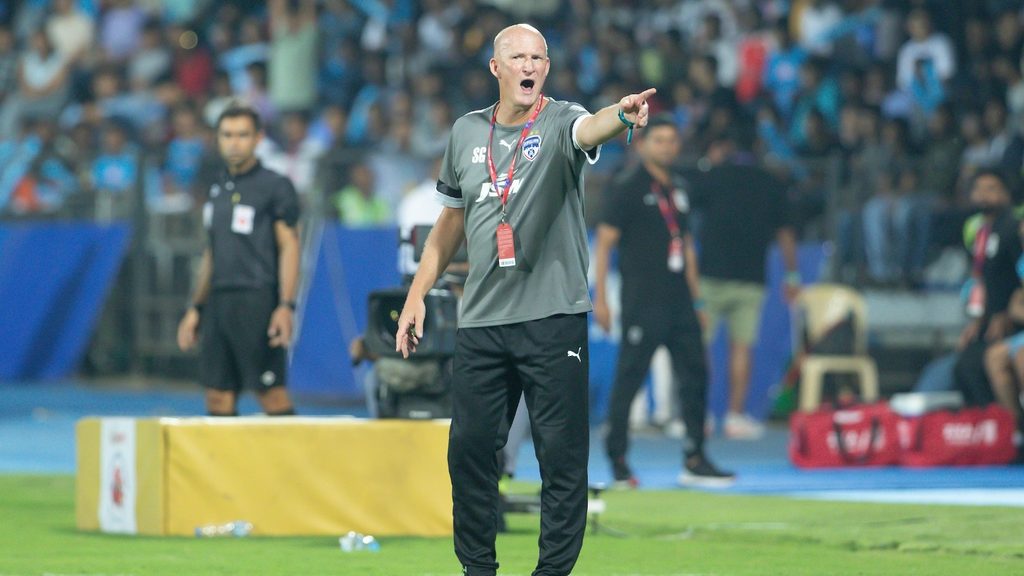Experienced and wise, Bengaluru FC’s Simon Grayson leaves his mark on Hero ISL
Simon Grayson walked into the Hero Indian Super League (ISL) with a bagful of experience in English football. Yet, like how most of the foreign head coaches entering Indian football, the 53-year-old had his work cut out to adapt to completely new surroundings and realities.

Simon Grayson walked into the Hero Indian Super League (ISL) with a bagful of experience in English football. Yet, like how most of the foreign head coaches entering Indian football, the 53-year-old had his work cut out to adapt to completely new surroundings and realities.
Grayson started his Indian football stint with a bang as he guided the team to Durand Cup success but found the going much harder as teams caught up with Bengaluru FC in a much more competitive environment in the Hero ISL.
The Englishman then had to go back to the drawing board before he was able to find a winning formula that has taken Bengaluru FC from tenth place in the league table to the final of the Hero ISL.
A peek into the coaching journey will tell you that Grayson has been known to find a way despite facing daunting challenges.
Grayson’s coaching career
A solid defender in his playing days, Grayson quickly turned to management after his career as a footballer which mostly consisted of stints in England’s top two flights was over.
The Englishman started his career at Blackpool where he ended his career as a player and guided the club to the Championship from League One.
He then moved to Leeds United and has the distinction of coaching clubs like Preston North End, Sunderland, Huddersfield Town and Bradford City.
In his career, Grayson won the Manager of the Month award in League One on five occasions while also winning the Manager of the Month prize in the Championship once.
He managed over 700 games in English football before making his way to Bengaluru FC in 2022.
Tactical approach
Solid defence:
Erik Paartalu’s analysis: It's robust and he has the players on the pitch to be that way. You've got seven defensive players plus the goalkeeper so that’s eight and the other three are entrusted to go over the top quickly to score goals.
It's not as simple as sitting in and counter-attacking, they can play if they want to but the stand-out for me has been the back three and their willingness to defend their own box.
Paul Masefield’s analysis:
Tactical flexibility: Simon Grayson changed it to a flat back four in the semi-final trying to chase the game. That ability and flexibility to change the system and get everyone to still do the same.

Grayson’s strengths
Adaptability:
Erik Paartalu’s analysis: Grayson's experience obviously sets him apart from most of the managers here in India but it's been his ability to adapt that has impressed me. It's easy for coaches to come to Asia and only do what they did back in their home countries or in tough times go into a shell and not let people around you help the situation. His acceptance and his attitude this season have been so refreshing to see.
Man-management:
Paul Masefield’s analysis: Simon Grayson's man-management and the way he handles his players is absolutely fantastic. When they were down and struggling, he told a few harsh truths to the team and he managed to galvanise the team, keeping them close together as a group.
After the Mumbai City FC defeat, the players talk about how everyone in the club got together and rallied together. I think Simon Grayson has done that. He has also found a system after trying a few formations and that has been the main key. All the players want to play for each other. They have a team ethic
Erik Paartalu’s analysis: The strategy to use Sivasakthi over Sunil Chhetri has paid off because he's got the pace to cause teams problems but also his management of Chhetri and when to throw him in has been first class.
Experience:
Phil Brown’s analysis: Simon Grayson knows to win key, heated games of football when the pressure is on. That has been vital in his career.

























